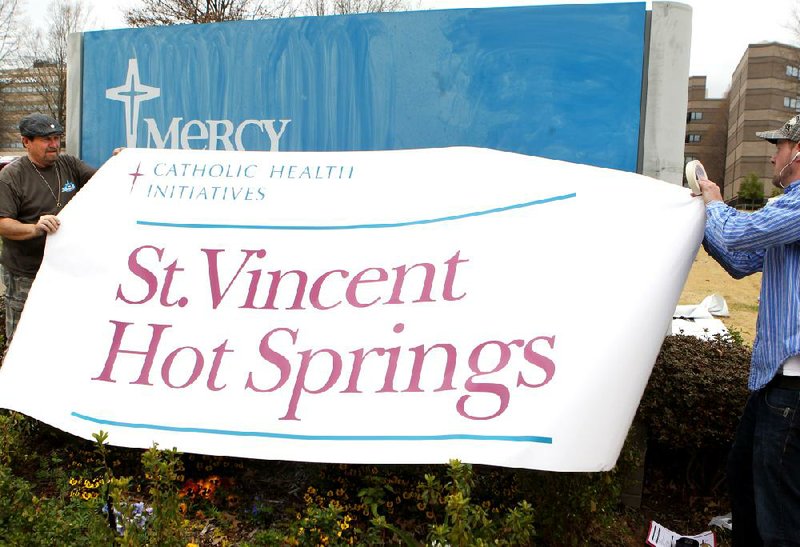Correction: January 2016 is the anticipated completion date of a 100-bed hospital to be built in Faulkner County by Little Rock-based Baptist Health. Also, about 7,700 employees work for Baptist Health. The hospital completion date and number of employees were incorrect in this article.
St. Vincent Health System announced Tuesday its acquisition of Mercy Hot Springs hospital and a physicians clinic, giving St. Vincent a projected annual net revenue of $700 million and challenging Baptist Health, the second-largest in the state.
As for hospital sizes, the University of Arkansas for Medical Sciences operates the state’s largest, UAMS Medical Center.
Baptist Health’s revenue in 2012, the most recent figure available, was $739 million, according to a federal filing.
Observers say the acquisition enhances health-care competition in the region.
St. Vincent and Baptist compete against each other “with a vengeance,” said Ray Hanley, president and chief executive of the Arkansas Foundation for Medical Care. “Competition is good for the consumer.”
Jonathan Timmis, senior vice president and chief strategy officer for St. Vincent, said, “We agree with that statement. Competition is good for the consumer. It forces us to compete on quality. It forces us to compete on cost.”
Mark Lowman, spokesman for Baptist, declined to comment.
St. Vincent Chief Executive Peter Banko said earlier Tuesday in a conference call that the acquisition of Mercy Hot Springs would increase St. Vincent’s revenue by 50 percent. Timmis said that the annual revenue of the St. Vincent system is about $450 million and the revenue from the Hot Springs hospital will add $250 million.
The sale price was not revealed, and the deal comes as nonprofit hospitals struggle to remain fiscally sound in a health-care landscape that has been reshaped by the federal Patient Protection and Affordable Care Act. The deal transfers the hospital from the St. Louis-based Mercy Health system.
Baptist Health registered a $2.4 million loss in 2012, primarily, it said, because of a reduction in government reimbursement.
St. Vincent is part of Denver-based Catholic Health Initiatives, whose revenue in fiscal 2012 was $12 billion, thus giving the Little Rock based health-care organization the security of deep pockets. Catholic Health now owns 88 hospitals in 18 states. The Mercy hospital has been renamed St. Vincent Hot Springs.
Little Rock-based Baptist Health has seven campuses with about 7,300 employees. Construction of a 100-bed Baptist Health hospital in Faulkner County is to start in May, with completion expected in January, Lowman said.
The addition of the Hot Springs hospital gives St. Vincent five campuses in central Arkansas, the largest being the 615-bed St. Vincent Infirmary Medical Center. St. Vincent Hot Springs has 282 beds.
St. Vincent is looking to expand in another way. It is expected to file an application soon to assume control of QualChoice, Arkansas’ second-largest health insurer.
With the merger, St. Vincent will employ about 4,500 system wide, including approximately 250 physicians, Banko said Tuesday. Timmis said the Mercy Clinic in Hot Springs is part of the deal. It has about 80 physicians. This is a good time to expand, according to Lisa Phillips, editor of Health Care M&A News. “Scale is where the advantage is,” Phillips said in an earlier interview. Nonprofits are especially feeling “vulnerable right now,” she said, adding that many are “trying to get into as many communities as possible.”
The deal came about after the failure of a proposed sale of Mercy Hot Springs to for-profit Capella Healthcare, a Tennessee-based chain It raised concern in the Catholic community that the Hot Springs hospital’s 126-year mission to serve the poor might be threatened by the sale.
Bishop Anthony Taylor of the Little Rock Diocese opposed the Capella deal and feared that Capella might not extend its ban on elective abortion beyond a proposed five-year period. Also, the Federal Trade Commission said it would fight the sale on the ground that it might hurt competition. Capella owns the National Park Medical Center in Hot Springs.
“The founding Sisters of Charity of Nazareth and the Sisters of Mercy would be proud to see their 126-yearold ministries strengthened today through the formation of a larger, regional health care system in southwest and central Arkansas,” Banko said in a news release.
Lynn Britton, Mercy Health president and chief executive, said in the release that the merger will enable its current employees to continue to “provide exceptional care and service to their community in a faith-based environment.”
In Arkansas, Mercy Health has hospitals in Berryville, Rogers and Fort Smith. It also has hospitals and clinics in Kansas, Missouri and Oklahoma.
Front Section, Pages 1 on 04/02/2014
